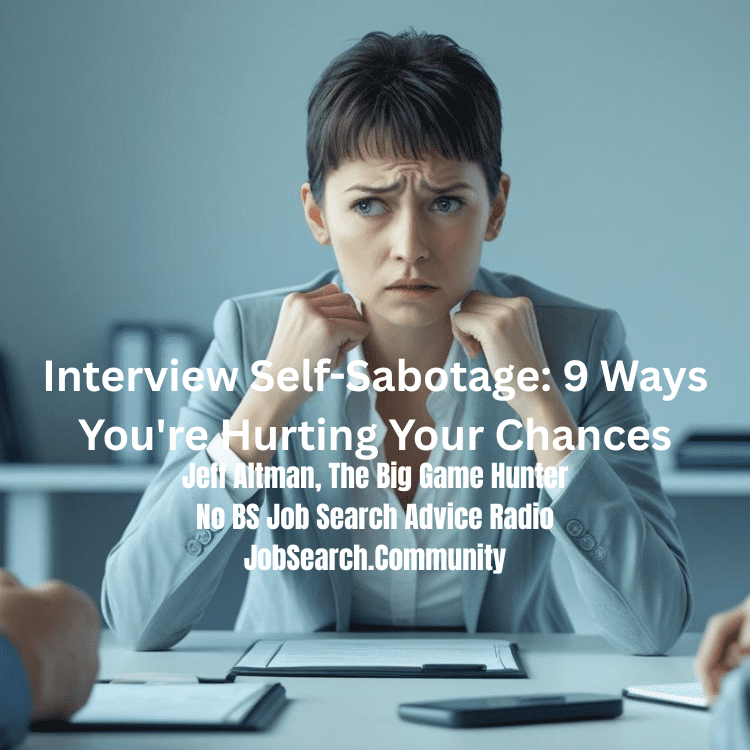By Jeff Altman, The Big Game Hunter
EP 3057 Are you tired of leaving interviews feeling like you blew it, but you’re not sure why? In this episode, we reveal 9 subtle (and not-so-subtle) ways people unconsciously sabotage their own chances during job interviews. Learn to identify these common pitfalls and arm yourself with strategies to overcome them, ensuring you present your best self and land the job you deserve.
Welcome to the Deep Dive. Today we’re cutting through the noise and pulling out the most vital insights from a stack of incredible sources about a topic that touches almost everyone’s life, job interviews. Specifically how to avoid those common pitfalls, you know, the ones that can trip you up before you even really get a chance to shine.
Our mission today is to equip you, our listener, with a shortcut to being well informed and really confident for your next interview. We’ve taken some fantastic material, including insights from seasoned interview coaches, real world examples, and we’re going to unpack the nine key ways people often inadvertently sabotage themselves. And more importantly, how you can avoid doing the exact same thing.
That’s right. We’re going beyond this sort of obvious dress well and beyond time advice. We’re looking at patterns, connecting the dots from, you know, successful interviews and bringing you the essential wisdom to navigate these things strategically.
You’ll gain practical, actionable advice that helps you understand not just what to do, but crucially why it matters, hopefully giving you some of those aha moments. Okay, let’s unpack this. Let’s jump right into a big one.
Money. It’s often the first hurdle. And frankly, many people inadvertently, well, throw money away during negotiations because they misstep really early on.
Absolutely. The first major mistake is destroying your negotiating position right at the outset, particularly when asked about salary expectations during, say, an initial phone screening. Job hunters often don’t realize this is the very beginning of the negotiation, you know, and their first answer can dramatically limit their future earning potential.
Okay. So if you’re on that call and they hit you with the dreaded, what are your salary expectations? Question, how do you deftly handle it without leaving money on the table? Right. The key is to pivot.
Your first move should be to ask them for the budgeted range for the position. In many places, they’re actually legally required to provide this now. Oh, interesting.
I didn’t realize that was legally required in some places. Yeah, it’s becoming more common. So if they give you a range, respond positively, but crucially, noncommittally, something like, that sounds like a good ballpark.
And I’m confident that once we determine this is a great fit, we’ll certainly agree on a fair and competitive compensation package. You keep it open. Okay.
Keep it open. But what if they’re hesitant or they say they don’t have a range readily available, or maybe they push back and insist you give a number first? Yeah, that happens. If they really press you, you can say you’ve done some research online and seen salaries for similar roles ranging from X to Y. Give a well-researched, fairly broad range based on your experience and the market value, but then immediately reiterate that you’re sure you’ll agree on something fair once a mutual fit is established.
You can also add something like, you typically see yourself at the mid to upper end of that range. That signals your value without committing to a specific number. Right.
Signals value. Exactly. The goal is really just to defer and redirect, keeping your options open for later.
Okay. So once we’ve masterfully navigated the money talk, that leads us to the actual content of your answers. The second pitfall you mentioned is giving those generic standard responses.
The ones that sound like they came straight off a website. Oh, this is absolutely crucial. While a formulaic approach might work okay for salary discussions, for questions about your experience, your approach, you need to be both authentic and strategic.
We sometimes call this the yin and yang of a good interview. It’s this essential balance between genuine self-expression and strategic alignment with the job’s needs. You have to be yourself, definitely, but it needs to be your best, most relevant self, proactively selling your fit for that specific job.
That idea of authenticity is powerful, yeah, but it also feels like a bit of a tightrope walk. How do you avoid rambling or maybe oversharing, especially when you’re nervous, while still being genuinely you? That’s a great point. Start with what we call the best friend answer.
Before the interview, literally say out loud what you’d tell your best friend if they asked you about that experience or skill. Okay, like a practice run. Exactly.
Like if they asked about a past project, you might tell your friend, oh man, that one was tough, but we totally nailed it. I remember thinking, get that raw, sincere thought out. Then you edit and polish it, add the strategic elements that tie it back to the job you’re interviewing for.
This helps you speak with a sincerity and emotional intelligence that interviewers really value. And they can tell, right? Oh, they can tell. They’ve heard canned answers a thousand times.
They can smell inauthenticity a mile off, and it’s a huge turnoff. Okay. Building on that, the third major misstep you highlighted is shooting yourself in the foot when asked about negative or sensitive subjects.
Things like, why did you leave your last job? Or maybe, tell me about your previous boss’s weaknesses. Those feel like minefields. Right.
They can feel tricky. But remember, every single question, even these so-called negative ones, is actually an opportunity to sell yourself. For handling these, we use a little tool called the ABC tool.
A is for analyze. First, quickly think, what are they truly trying to learn here? If they ask about a difficult boss, they’re probably looking for things like discretion, emotional intelligence, your ability to work with different personalities, or maybe your conflict resolution skills. Ah, okay.
So understand the real question behind the question. Precisely. Then B is for brevity.
Keep the negative part incredibly brief. Don’t launch into a long winding story about why you were laid off or why you had a challenging boss. For instance, if you were laid off, a brief professional answer might be something like, 50 positions were eliminated from my company due to restructuring, and unfortunately, one of them was mine.
After taking care of some personal business and enjoying some long-awaited time off, I started looking for not just any job, but specifically the right job where my skills could truly make an impact. See? Brief, professional, forward-looking. Got it.
Brief on the negative. Then C is for circle with positives. Always, always follow that brief, negative part with positives.
For a difficult boss question, you might say something like, my boss was incredibly passionate about his work in achieving excellence. While I prefer to focus on the positive aspects of my past experiences, we were actually able to achieve some remarkable things together, and I’m really looking forward to discussing those achievements with you. Or, if asked about your own weakness, briefly acknowledge it, but immediately state what you’re actively doing to improve it.
Frame it as a growth opportunity. That ABC framework sounds incredibly helpful for structuring the content. But what about the delivery? How long should answers like these actually be, particularly for those sensitive topics? Good question.
Generally, you want to aim for about a minute to maybe a minute and 15 seconds for most answers. We live in a world of short attention spans, right? Don’t make them tune out. Yeah, keep it concise.
Exactly. And for those negative topics, probably even shorter, maybe around 40 seconds or so. Just enough to address it, get off the hook, and pivot to something positive as quickly as possible.
Address it, but move on. Okay. That perfectly leads us to pitfall number four, rambling.
It’s so easy to do when you’re nervous or, you know, trying really hard to impress. Oh, this is one of the most common issues we see. The solution is partly careful planning, but also self-awareness in the moment.
Have a mental map, maybe two, three key points for common questions. And if you find yourself starting to wander, interrupt yourself gracefully. Seriously.
You can say something like, long story short is, or to get to the essence of it, what I’m trying to convey is, and then just get straight to your main point. Interviewers actually appreciate that kind of conciseness. That’s good advice, interrupting yourself.
And when you are done, how do you signal that without that awkward pause or maybe that upward inflection that sounds like you’re asking a question? Yeah, that upward inflection is deadly. Know your ending. Often it’s just a slight downward note in your voice indicating completion.
It sounds more confident than a rising tone that makes you sound unsure or like you’re asking, was that okay? You can also briefly refer back to the question you were asked, or even better, refer forward to how your experience relates directly to their company or the role. The idea is to concisely tie everything together with what they need. Okay.
So moving on to number five, don’t just sit back and hope they ask the right questions to highlight your strengths. You need to be proactive about your messaging. This feels like a real strategy shift.
It absolutely is. You need to go into every single interview knowing what unique special qualities you want to convey. What are your top two or three key selling points? What’s your personal brand for this specific role? What genuinely makes you stand out from the dozens, maybe hundreds of other applicants? This requires a bit of introspection about your career narrative before you even walk in the door.
So once you’ve identified those standout qualities, how do you actually weave that into the interview naturally, especially early on? Your answer to those foundational questions like, tell me about yourself or walk me through your background, needs to strategically bring out those top two or three qualities right away. And here’s a pro tip. Even before they ask, tell me about yourself, you could try to slip in a clarifying question about their top priorities for the role.
Something like, before I dive in, could you share what the top one or two priorities are for the person in this role in the first six months? Ah, clever. Get them to tell you what they care about most. Exactly.
This then allows you to tailor your initial summary. You can start with a concise, maybe 20 second synopsis of your overall experience and then directly connect it to what’s most relevant for their specific stated needs. It’s a powerful way to show your unique fit right at the start.
And it demonstrates you’ve done your homework and you’re focused on their problems. That really does sound like a powerful way to differentiate yourself right from the get-go, which brings us neatly to number six. Don’t wait until the very end to ask your questions.
Yes. The best interviews, the most memorable ones, become dynamic conversations, not just one-sided interrogations. This makes both parties more comfortable, honestly, and it allows everyone to shine a little more.
It really levels the playing field when both sides are engaged in a genuine dialogue. So beyond that opening clarifying question you just mentioned, what are some other practical ways to turn an interview into more of a, you know, a two-way street? Well, you can ask for more background when they pose a question. For example, you could say, that’s a great question and I’d love to answer it, but just to make sure I’m hitting the mark, could you tell me if you’re more interested in the x-aspect or the y-aspect of that, or perhaps what that looks like here at your company? So you tailor your answer better.
Precisely. It ensures your answer is targeted and immediately relevant. Also, at the end of one of your answers, you can ask something like, was that the level of detail you were looking for? Or is there anything more you’d like to know about that particular experience? Well, maybe even… Or even, how does that approach compare to how things are typically done here? The goal is simply to get them talking, show your genuine interest in their company and the role itself, and demonstrate that you’re an engaged, curious, thoughtful professional.
Moving on to number seven, being vague. You mentioned this briefly, but generalities just don’t cut it in an interview setting, do they? Absolutely not. You need to be specific.
Specificity is credibility. When discussing your experience or your approach, use concrete examples. Quantify your results whenever possible.
Money saved, money earned, percentage improvements, time reductions, increased efficiency. Business fundamentally speaks the language of numbers. Even if you don’t have exact figures readily available, use strong adjectives like dramatically improved, significantly reduced, or substantially streamlined.
What about roles where it’s harder to quantify? Like, maybe more creative or people-focused roles? Great question. For roles that aren’t as easily quantifiable, use compelling anecdotal evidence. Tell a brief story that illustrates your point.
Or, even better, use direct quotes from superiors or clients about your impact. For instance, you could literally quote a powerful compliment from a CEO about an initiative you led. Or explain how your project streamlined a process, perhaps saving five hours a week for three team members.
Frame it in terms of resources or time recovered, not just direct revenue. This makes your answers specific, interesting, and frankly, incredibly memorable compared to vague claims. That’s fantastic advice for making your impact crystal clear.
But it raises another important question. How do you prove those intangible qualities, the, you know, the soft skills or emotional intelligence? That brings us to number eight. Right, the soft skills.
You don’t just claim you’re empathetic or a good team player. You have to demonstrate it throughout the entire process. How do you demonstrate it? It means actively showing empathy and respect to everyone you encounter, from the person who scheduled the interview, to the receptionist, right through to the hiring manager.
It means being patient if there’s an interruption, listening attentively, and generally treating people with genuine care, not just, you know, phony politeness. Interviewers are constantly observing how you interact, not just what you say. Okay, so demonstration is key.
But beyond that immediate interaction, how can you provide more concrete evidence of these softer skills in your answers? Look for social proof before the interview. Strong LinkedIn recommendations, for example, are often reviewed by interviewers before they even meet you. Make sure those are up to date and relevant.
Then in the interview itself, have prepared stories ready. Situations where you clearly demonstrated teamwork, resolved a conflict effectively, showed leadership, or maybe coached a junior team member. Many people find structured frameworks helpful here, like star situation, task, action, result, or search situation, obstacles, actions, results.
Right, the star method. I’ve heard of that. Yeah, there’s just structured ways to tell a concise story that demonstrates your skills and impact.
But the absolute most critical part of any of these frameworks is the R, the result. Don’t just tell the story and stop. Don’t shortchange the impact you actually made.
Quantify it if you possibly can. Describe the tangible benefit to the company or, as we mentioned, quote someone’s positive feedback about the outcome. Always, always focus on the positive outcome of your actions.
Excellent point. Okay, finally, number nine. Not preparing sufficiently in advance.
It sounds almost too obvious, but clearly it’s a massive pitfall people fall into. It’s truly astonishing how many people wait until maybe an in-person final round interview is to really start preparing seriously. But by then, they might have already fumbled a crucial phone screening or an earlier virtual interview without even realizing it.
The core insight here is simple. Realize that any conversation with a potential employer, from that very first recruiter call to an informal coffee chat, is effectively an interview. You need to have prepared some of these elements we’ve discussed.
Your key selling points, your salary thoughts, your negative situation answers, as soon as you’re actively in the job market, maybe even before you start applying. So you’re saying don’t wait. Don’t wait.
You don’t want the very first time these crucial words or stories come out of your mouth to be in the actual high stakes interview situation. So for the listener who wants to be truly ready, what does comprehensive preparation really look like in practice? Okay, realistically, give yourself at least a full week to prepare properly for a significant interview. Practice your answers out loud.
Seriously, not just running through them in your head, hearing yourself say it is different. Do mock interviews. Get a trusted friend, a partner, maybe even a professional coach, and actively ask for honest feedback.
Don’t just practice. Get specific feedback on your tone, your pacing, your body language, your facial expressions. Especially with video interviews being so common now, right? Exactly.
If you’re using video, check your background obsessively for distractions. Make sure your lighting is good. Ensure your energy, your excitement, your personality actually come across authentically through the screen.
And review recordings if you can. Look at how your gestures and expressions might reveal unconscious habits. Maybe you fidget or look away too much.
Anything that takes attention away from you and your message is basically a liability. Thorough preparation builds confidence, reduces anxiety, and ultimately allows your authentic best self to shine through when it counts. Wow, that was a truly insightful deep dive into avoiding self-sabotage in interviews.
Really practical stuff. From mastering those tricky salary discussions and handling tough questions gracefully, to proactively highlighting your unique value, proving your soft skills, and truly understanding the critical power of preparation. It’s clear that strategy, authenticity, and practice are definitely your best friends.
Indeed they are. By understanding these nine common pitfalls, and more importantly, proactively addressing them, you’re not just passively answering questions anymore. You’re actively shaping the narrative.
You’re demonstrating your unique value, and you’re working to transform the interview into a genuine, engaging conversation. Remember the importance of being specific, being concise, and making every single interaction count. So what does all this mean for you, the listener? It means you absolutely have the power to transform your entire interview experience.
You can find helpful resources online. There are books about winning interviews, free tools like infographics on handling salary questions, negotiation templates to help you plan your strategy. Many experts also offer coaching services if you need more personalized help with resumes, LinkedIn profiles, or developing a comprehensive job search strategy.
And maybe here’s a final provocative thought for you to consider as you prepare. Interviewers are often quite paranoid, maybe understandably so, about making a bad hire. Statistics actually suggest a pretty high percentage of hiring managers experience what they call buyer’s remorse within 18 months of hiring someone.
Understanding this underlying fear, this anxiety on their side, can help you frame your answers, not just to show you’re a good candidate, but to actively alleviate their anxieties, to demonstrate that you are not just the best choice, perhaps, but also the safest choice. What does that perspective shift change about how you might approach your next interview? That’s definitely something to mull over. We really hope this deep dive has provided you with valuable, actionable insights for your job search journey.
We’ll be back soon with more fascinating information to help you navigate the world. Be great!
Be Prepared to Walk Away from a Job Offer
ABOUT JEFF ALTMAN, THE BIG GAME HUNTER
People hire Jeff Altman, The Big Game Hunter to provide No BS job search coaching and career advice globally because he makes job search and succeeding in your career easier.
and succeeding in your career easier.
Career Coach Office Hours: May 14 2024
You will find great info and job search coaching to help with your job search at JobSearch.Community
Connect on LinkedIn: https://www.linkedin.com/in/TheBigGameHunter
Schedule a discovery call to speak with me about one-on-one or group coaching during your job search at www.TheBigGameHunter.us.
What Recruiters Know That You Don’t: They Aren’t Watching All Those Screening Videos
We grant permission for this post and others to be used on your website as long as a backlink is included to www.TheBigGameHunter.us and notice is provided that it is provided by Jeff Altman, The Big Game Hunter as an author or creator. Not acknowledging his work or providing a backlink to www.TheBigGameHunter.us makes you subject to a $1000 penalty which you proactively agree to pay. Please contact us to negotiate the use of our content as training data









